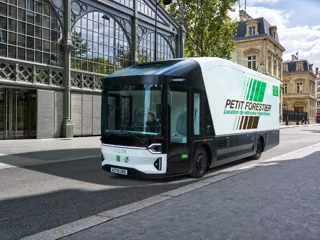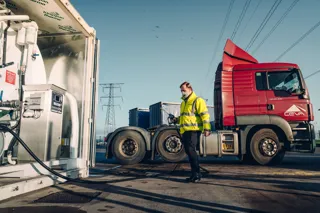Europe’s truck manufacturers have concluded that by 2040 all new trucks sold need to be fossil free in order to reach net zero by 2050.
Meeting this target, however, will only be possible, if the right charging/refuelling infrastructure is built and policy framework is put into place, they say.
To develop their roadmap to carbon-neutrality by 2050 at the latest, the CEOs of Europe’s commercial vehicle manufacturers, under the umbrella of the European Automobile Manufacturers’ Association (ACEA), have joined forces with scientists from the Potsdam Institute for Climate Impact Research (PIK).
Henrik Henriksson, chair of ACEA’s commercial vehicle board and CEO of Scania, explained: “If road freight transport is to maintain its role in serving society, we need to move away from fossil fuels as quickly as possible.
“Not only are we convinced that it is necessary, we know it is possible and we are ready to make it happen. But we cannot do it alone; we need policymakers and other stakeholders to join forces with us.”
A joint declaration by ACEA and PIK, published today, outlines the roadmap and conditions for transforming the road freight transport system.
"Government will need to help operators absorb that cost burden," Gerry Keaney, BVRLA
Alongside investments by the commercial vehicle industry, this includes policy options such as road charges based on CO2 emissions, and an energy taxation system based on carbon and energy content.
A dense network of charging and refuelling infrastructure suitable for trucks is also crucial for the operation of low- and zero-emission heavy-duty vehicles, it says.
According to ACEA and PIK, a CO2 emissions pricing system could also be one of the most effective tools, as zero-emission vehicles simply will not take off as long as diesel remains cheaper.
In the UK, the Government has announced it will end the sale of new petrol and diesel cars and vans by 2030. It says it will also launch a consultation on the phase out of new diesel HGVs.
More recently, the Committee on Climate Change (CCC) published its Sixth Carbon Budget Report, which includes research by Element Energy to consider pathways to decarbonising this sector.
The study showed that battery-electric vehicles, electric road systems and hydrogen fuel-cells could all play a role within this sector and it is too soon to say with certainty which technology choices will be cost-optimal.
It also said that given the state of market development and uncertainty over costs, it is too soon to tell which will be the most cost-effective and feasible solution.
"Large commercial-scale demonstrations, involving hundreds of vehicles and lasting at least 1-2 years, should be planned and implemented over the coming years to further test deployment of each technology and produce real-world data on costs and operational feasibility," the report says.
"The high upfront cost of zero-emission HDVs means that our analysis does not expect them to become cost-saving from a social perspective before 2050."
Like the ACEA report, it also concludes that decarbonisation of the transport sector will require widespread uptake of zero emission HGVs by 2040 to enable almost full decarbonisation of the fleet by 2050.
Gerry Keaney, chief executive of the trade group the British Vehicle Rental and Leasing Association (BVRLA), says setting a date for the phasing out of diesel trucks and lorries is a positive step, but HGV operators need a "zero-emission roadmap".
"Upgrading fleets and refuelling infrastructure to adopt hydrogen or battery electric technology will be very expensive and the Government will need to help operators absorb that cost burden," he said.
"Many trucks travel huge distances, cross many borders and rely on public fuelling facilities, so UK policymakers will need to align their freight decarbonisation strategy with other countries.”
Action needed 'now'
Earth system scientist, Johan Rockström of PIK, says that science shows us that in order to avoid crossing "dangerous tipping points" in the Earth system, action is needed now by combining all available solutions to make a "rapid shift to carbon-neutrality".
“Zero-emission vehicles will not only bring down CO2 emissions, they will also further improve air quality levels – a factor of crucial significance for human health,” he said.
"A first step has been taken with the ACEA/PIK cooperation, as industry and science start to work together in a strategic partnership to accelerate the transition, on the basis of scientific information.”
Alastair Hayfield, senior research director for commercial vehicles at market research firm Interact Analysis, says that the current medium- and heavy-duty battery electric truck market is very small.
In Europe, it amounted to 124 units in 2019 (44 medium-duty trucks and 80 heavy-duty trucks).
Meanwhile, in 2019, the European market for hydrogen fuel cell medium- and heavy-duty trucks was negligible.
“Of the named members of the alliance of truck manufacturers, Daimler, Scania, MAN, DAF, Volvo, Iveco and Ford, three appear in the top six 2019 European suppliers of medium- and heavy-duty battery electric trucks and buses: Volvo at 16%, MAN at 10% and DAF at 9%," he said.
But in real terms this only actually amounted to 20, 12, and 11 units respectively.
He continued: “By 2030, which is as far out as our projections reach, our research shows that the total medium-duty truck market for Europe will be 43,168 units. While for heavy-duty trucks the total 2030 market will be 292,569 units.
“To achieve the highly ambitious target of weaning themselves off fossil-fuel-powered models by 2040, these truck manufacturers will need to implement an absolutely massive ramp-up of their capabilities to manufacture battery and fuel cell electric trucks in a very short space of time.
“However, we also believe that the ambitions of these truck manufacturers may be very much in step with reality because our research also shows that EMEA will hit peak internal combustion engine commercial vehicle registrations in 2024 and the UK actually already passed peak sales for commercial vehicles with combustion engines in 2019.
"This trend means that engine manufacturers in particular will struggle to justify major investments in internal combustion engine R&D or manufacturing.”
The European Automobile Manufacturers’ Association (ACEA) is the Brussels-based trade association of the 16 major car, van, truck and bus manufacturers in the EU.
























Login to comment
Comments
No comments have been made yet.